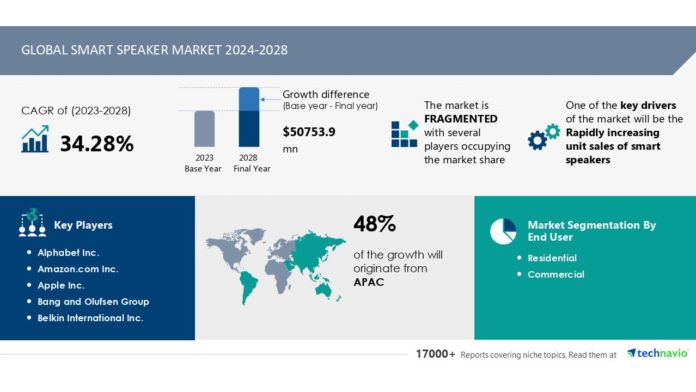Report on how AI is driving market transformation- The global smart speaker market size is estimated to grow by USD 50.8 billion from 2024-2028, according to Technavio. The market is estimated to grow at a CAGR of 34.28% during the forecast period. Rapidly increasing unit sales of smart speakers is driving market growth, with a trend towards increasing popularity of voice commerce. However, privacy and security threats associated with smart speakers poses a challenge. Key market players include Alphabet Inc., Amazon.com Inc., Apple Inc., Bang and Olufsen Group, Belkin International Inc., Bose Corp., Edifier International Ltd., Imagine Marketing Pvt. Ltd., Lenovo Group Ltd., LG Electronics Inc., NXP Semiconductors NV, Onkyo Corp., Portronics Digital Pvt. Ltd., Qualcomm Inc., Samsung Electronics Co. Ltd., Sonos Inc., Sony Group Corp., Xiaomi Communications Co. Ltd., Zebronics India Pvt. Ltd., and Zound Industries International AB.
The voice commerce market is experiencing significant growth due to the convenience and ease of use it offers. With voice commerce, consumers can place orders and make purchases online using only their voice, eliminating the need for keyboards, mice, or smartphones. Smart speakers, such as those with Google Assistant or Amazon Alexa, enable this technology. For instance, Amazon’s Alexa can suggest products based on a user’s past purchases and complete transactions with simple voice commands. This hands-free functionality and ability to multitask are major advantages of voice commerce, making it increasingly popular. As a result, the demand for smart speakers is expected to rise in the global market during the forecast period.
The smart speaker market is booming with the rise of digital technology and wireless voice-enabled devices. Intelligent virtual assistants like Siri, Alexa, and Google Assistant are leading this trend, enabling users to control their homes and appliances using voice commands. Smart homes are becoming more commonplace, with smart home products and appliances integrating with Wi-Fi and Bluetooth-enabled speakers. Data-steered innovations are driving advancements in voice patterns and artificial technology, but concerns over data misuse and security risks persist. Baidu and other speaker manufacturers are investing in AI to enhance virtual assistant capabilities, with display-based devices and virtual assistants for TVs, radios, and even smart locks on the horizon. Online platforms are also integrating with smart speakers for seamless control of smart home devices and hubs. However, it’s essential to prioritize data security and privacy in this rapidly evolving market. IOT and smart devices are transforming our lives, and smart speakers are at the forefront of this revolution. Sensors and voice assistance are making our homes smarter and more convenient, but it’s crucial to stay informed about the latest trends and potential risks.
The global smart speaker market faces challenges due to privacy and security concerns. Many consumers are apprehensive about potential threats to their conversations and personal data. Manufacturers employ staff to review voice recordings for speech improvement, increasing privacy worries. Smart speakers are susceptible to various cyberattacks, including DDoS, MiTM, data breaches, APTs, and ransomware. These vulnerabilities can deter users and provide attackers access to IT infrastructure. Mass-produced, identical smart speakers make them easy targets for hackers using weak passwords. Compromised devices could disrupt networks or spread malware. Despite manufacturers’ efforts to protect customer data, the absence of stringent privacy policies and regulations heightens the risk, potentially hindering market growth.
The smart speaker market is booming with the rise of digital technology and wireless voice-enabled devices like smart speakers. These devices, powered by intelligent virtual assistants, offer convenience through voice commands and control over various smart home products and appliances. Wi-Fi and Bluetooth connectivity enable seamless integration with other data-steered innovations. However, challenges include data misuse, voice patterns recognition, and security risks. Speaker manufacturers must prioritize data security, ensuring user privacy. Smart homes, IOT, and smart devices are driving the market, with smart speaker usage expanding to include virtual assistants, wireless speakers, and even display-based devices. Baidu’s entry into the market intensifies competition. Smart home hubs, sensors, and integration with smart locks, TVs, radios, and online platforms are key considerations. AI and virtual assistants are essential, but so is addressing concerns around data security and privacy.
The residential segment of the global smart speaker market is experiencing notable growth due to the increasing popularity of smart speakers in households. The convenience of voice control and the ability to connect with various digital streaming platforms and devices make smart speakers a necessity in modern homes. The recent trend of digital content consumption through services like Amazon Prime, Netflix, and YouTube has further the importance of smart speakers. In the US, the number of households owning more than one smart speaker is on the rise. Additionally, the increasing investment in home renovation projects, particularly in living spaces, has led to a strong correlation between home improvements and the adoption of smart speakers. As a result, the residential users segment of the global smart speaker market is projected to expand at a rate during the forecast period.
The Smart Speaker Market is experiencing rapid growth as more households integrate digital technology into their homes. Smart speakers, also known as wireless voice-enabled devices, are becoming essential components of IoT-enabled smart homes. These devices use Wi-Fi or Bluetooth connectivity to link with other smart home devices and hubs, enabling voice-activated control of various smart home appliances and products. Smart speaker usage extends beyond playing music and includes setting alarms, controlling lights, adjusting thermostats, and accessing information through intelligent virtual assistants. Sensors integrated into smart speakers and other smart home devices collect data, leading to data-steered innovations that enhance user experience and convenience. The market for smart speakers is expected to continue expanding as more consumers embrace the benefits of a connected and voice-controlled home.
The smart speaker market is experiencing rapid growth as more consumers embrace the concept of a connected home. Smart speakers, wireless voice-enabled devices that use Intelligent Virtual Assistants (IVAs) like Amazon Alexa, Google Assistant, and Apple Siri, are at the forefront of this trend. These devices integrate seamlessly with other smart home devices, such as thermostats, lights, and security systems, creating a network of interconnected IoT devices. Smart speakers can control smart home hubs, activate sensors, and even unlock smart locks through voice commands. However, the increasing use of smart speakers raises concerns about data security and potential misuse of voice patterns and personal information. Digital technology companies and speaker manufacturers continue to innovate, introducing data-steered innovations like AI-powered TVs, radios, and even refrigerators. Online platforms offer a range of smart home products and appliances, from wireless speakers to virtual assistants, creating a vast ecosystem of connected devices. While the benefits of a smart home are numerous, it is essential to consider the potential security risks and ensure that data is protected. Baidu’s DuerOS and other voice assistance platforms are also gaining popularity in the market, adding to the competition.







